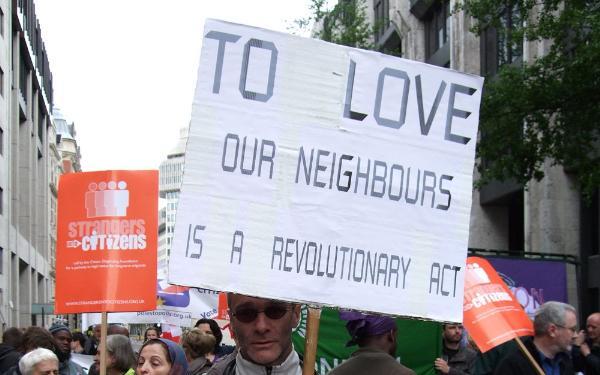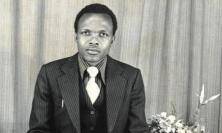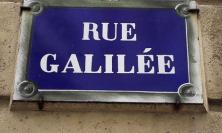On Monday 4 May, an estimated 20,000 people participated in a rally in London’s Trafalgar Square in support of the Strangers into Citizens campaign. Who are the people that this campaign seeks to help? James Conway SJ shares the stories of the undocumented migrants who find support in London’s parishes, and explains why a pathway to regularisation will make such a difference to their lives.
Jacob and Ramoz
‘Oh, Jacob will do that’, I remember being told when I first arrived at St. Ignatius parish in Stamford Hill, ‘he’s always happy to help.’ Jacob was well-known in the parish. He was an usher at the Sunday Masses and helped to serve the teas and coffees afterwards. An exuberant young man in his early thirties, he had arrived from Nigeria on a student visa 15 years before. One day, I received a call from a solicitor telling me that Jacob was being detained and prepared for deportation. Three days later, despite our best efforts to intervene, he had gone.
It was long after Jacob’s departure that the story emerged of his undocumented status in the UK. Only a few trusted friends – parishioners – had known of his shadow existence. He had overstayed his student visa by twelve years and in that time had changed address eight times, frightened that anything too permanent might lead to detection by immigration authorities. He had been detained five years before and had avoided deportation, but since that time had been required to register every Monday at an immigration office. He worked illegally as a part-time security guard on the other side of London, and did various cleaning and dishwashing jobs in the early mornings and late evenings. As the eldest of 10 children, he would send his family a substantial amount of his earnings each month. His father had passed away during Jacob’s time in the UK and was buried without his eldest son’s presence because Jacob couldn’t leave the country. His aged mother and aunt depended on the remittance sent home every month, and many of his younger siblings had been educated on the strength of it.
Jacob’s story, although unique, is not exceptional. I have heard many others describe how they live in fear of being found out or ‘picked up’, and how they are exploited in the workplace. Ramoz, from Brazil, appeared at the front door of the Presbytery one morning after reading the noticeboard in the Church. He wanted to know about the poster he had seen there advocating ‘Strangers into Citizens.’ He listened intently as I explained the campaign, initiated by the Citizens Organising Foundation, for the regularisation of long-term migrants. I explained that St. Ignatius Church, being very much a migrant parish and situated in a relatively poor part of the capital, had some parishioners and neighbours who were undocumented. It is important then, I told him, for us as a parish to express our solidarity with the undocumented and to do everything we can to help them attain legal status in the UK.
Having sensed that this was a safe place, Ramoz disclosed that he himself ‘lived in the shadows’, and had done for almost nine years. It is difficult to trust people, he explained, as he expressed his relief at finding someone – a priest – who could listen to his story. Ramoz, like Jacob, had three jobs. Early each morning he travelled to the City to clean the offices of a prestigious finance company before going to work in a coffee bar for six hours. From 8pm until midnight he delivered takeaway pizzas in north London. Ramoz was distressed because he had not received payment from his cleaning job for six weeks. His manager, as well as refusing to pay him, had told him not to go back again. ‘But what can I do?’ Ramoz asked. ‘He knows I don’t have any papers.’ The implications of this are enormous because, as well as going unpaid, Ramoz had to change his address. He felt vulnerable because his former manager knew where he lived and, if he wanted to, could tip off the authorities. He described living in such a way that you must always be watching your back, whilst acknowledging the danger of becoming paranoid. It is easy to imagine that everyone knows your status – people you live with or even strangers walking down the street. He grimaced as he recalled the time when two policemen walked into the coffee bar and joined the queue. ‘I almost fainted,’ he said, ‘I started sweating and could hardly speak because I thought they had come to get me.’ Thankfully they ordered two coffees to take away and left.
No borders here
Strangers into Citizens gives hope to hundreds of thousands of people like Jacob and Ramoz. A recent piece of research by the London School of Economics[1] suggests that roughly 725,000 people live without regular legal status in Britain. The BBC programme Panorama recently showed that many of these people fill essential roles in the structure of society; they care for the elderly and drive buses. Many more, like Ramoz and Jacob, work in the service sector and help keep our restaurants open, offices clean and shop shelves filled. Certainly, many of them fill the pews at Sunday Masses and attend religious services throughout the country, especially in the capital where, according to the LSE report, the majority of undocumented migrants live and work.[2]
For many migrants the Church offers a link with the past, a sort of continuity with something familiar and lasting. For these reasons, some come back to the Church after having left it years before in their home country; they find they need it in a way that they didn’t at home. In coming back, they find a sense of belonging and community and, in some cases, a new sense of purpose. For undocumented migrants in particular, the Church and other religious institutions offer a safe space. ‘It is the place I can be myself,’ a young Cameroonian man told me recently, ‘where I can sit before God and feel OK. He doesn’t care whether I’m legal or not.’ There are no ‘illegals’ to God, no borders here.
These sentiments seem to be shared by other migrants. The Ground of Justice[3], the Von Hugel Institute’s report on the needs of migrants in London’s Catholic community, found that for many the Church was like a ‘home away from home.’ ‘Many’, it says, regard the Church as a ‘refuge, a harbour of hope and worship, where the idea of a Eucharistic feast is also grounded in lived community.’ [4] This seemed to be what Ramoz was getting at when he said: ‘I come to Church to get nourished and to feel that I belong to something bigger. I can pray for my family in Brazil and it helps me forget my situation.’
Ramoz and other undocumented migrants like him carry a heavy burden. Not only may they suffer exploitation in the workplace and exclusion from many forms of civic life, but they experience the paralysing fear of being found out or of being betrayed by colleagues or friends – and on top of this they carry the huge expectations of their families back in their home country. Almost all of those that I have met have been sending money home whilst struggling to keep a roof over their heads in London and to feed themselves, cover their bills and travel costs. Many of them share small bedsits with three or four others and arrange sleeping times around one another’s working schedules. They work in jobs that offer no entitlements to sick pay or holiday and, as Ramoz learned, can be quickly and often painfully terminated. An undocumented person’s life, I have come to discover, is characterised by insecurity and a constant feeling of being dependent upon and therefore vulnerable to an assortment of external forces.
A pathway to citizenship
A pathway to citizenship like that proposed by Strangers into Citizens, which allows the undocumented who have lived ‘in the shadows’ for four years or longer to come out into the light and declare their presence, would alleviate much of this burden. The campaign proposes a two-year pathway in which workers would be allowed to apply for working permits. During this period, they would actively contribute to the economic and civic life of the nation by, on one hand, paying taxes[5] and other national insurance contributions and, on the other, by learning the English language and displaying a willingness to integrate into a national and local way of life. Compliance with the pathway criteria would result in an ‘indefinite leave to remain’ being issued at the end of the two years and thus, eventually, if the person so desired and at the end of a stipulated length of time, the possibility to apply for naturalisation.
Strangers into Citizens argue that the proposed pathway to citizenship would have beneficial effects on: a) the individuals involved and their families, many of whom live in impoverished parts of the world; b) the British economy and the effective functioning of the taxation and welfare systems; and c) community cohesion at both a national and local level, through active citizenship and involvement in local community development, and also by extending the protection of the law to those currently denied it, who would be brought into line with the law and therefore must comply with it.
Many groups would benefit from the introduction of such a regularisation pathway:
-
Employers – they currently bear the consequences of employing illegal workers and, as a result, often struggle to recruit the right people
-
Local authorities – many authorities, especially those in parts of the country with a high number of undocumented migrants, have no realistic way of knowing the true number of people in their ward, and therefore struggle to plan for adequate provision of public services
-
Regular workers doing low-paid jobs – at the moment, national minimum wage levels are often undermined by the undocumented who, because of their irregular status, are forced to accept work which pays much less than the minimum requirement
-
Police and immigration authorities – with regard to the former, regularisation would shrink the thriving black market in forged papers and thus allow thousands of police hours and investigative time to be redirected towards other criminal activity. It would benefit the latter by releasing border and immigration workers, currently engaged in clearing asylum backlogs and monitoring those refused asylum, to work more effectively in strengthening and maintaining the country’s borders.
However, to my mind – and I think the same applies to many others involved in the Strangers into Citizens campaign, as well as to those who propose alternative models of regularisation – the most compelling argument is a moral one. The conditions in which many of the undocumented are forced to live and work are an infringement on their human dignity, the dignity that is repeatedly highlighted and celebrated in Catholic Social Teaching. Surely one cannot ignore a situation in which the vulnerable are continuously exploited and silenced through their own fear? This is a problem that, if not addressed, will undermine any attempt to build meaningful local communities and a cohesive society. As a nation we have a duty to support these individuals. If one recognises, as the government does, that a sizable number of undocumented migrants live and work in the UK and that many of them have been here for a significant amount of time, then it must consider ways of resolving their and the nation’s predicament. This suggests two alternatives. On the one hand, it can seek to deport to their countries of origin all of those estimated 725,000 people who are in Britain without the legal right to remain; or, on the other, it can look for ways of regularising the situation so that the undocumented among us can live dignified lives, in this country. If, as has been suggested (in 2005), the cost for removing one undocumented person from the country is around £11,000, and if all of those ‘living in the shadows’ could be found and deported, then, at the current rate of removals, it would take over 25 years to complete a mass deportation and cost over £5billion.[6] This being the case, the former alternative is not a viable option and so the government should, despite opposition, consider feasible pathways to regularisation. If it refuses to do so then it appears to condone ‘a modern day slavery.’ [7]
‘Strangers into Citizens: a pathway to citizenship’ recognises the government’s responsibility to strengthen and secure the country’s borders and therefore to have an effective immigration system. However, it also sees that any attempt to successfully supervise and restrict the flow of new migrants into the country depends on regularising the currently irregular migrants who are already here. It therefore takes unto account the logistical and political concerns but seeks to resolve the painful situation of those already here who have put down roots and cannot or will not return to their countries of origin.
On Bank Holiday Monday, 4th May 2009, a group of parishioners from St Ignatius Church joined Catholics from around London and from other parts of the country at Westminster Cathedral for a Mass for Migrants. Simultaneously, five other religious services took place in central London. The congregations, representing an assortment of Christian denominations and other faiths, joined together at the end of their respective services and marched to Trafalgar Square where, with other civic and community groups, trade unionists, members of parliament and interested individuals, they rallied for Strangers into Citizens. All of the different groups present are likely to have had with them, known or unknown, people like Jacob and Ramoz: undocumented, vulnerable migrants living precarious lives in the shadows of British society. Perhaps, for once, they felt valued, not only for the contribution they make to the economic and civic life of the city and nation, but for simply being who they are: our sisters and brothers. A sense of belonging that is rooted in this knowledge and manifested through acts of shared worship and solidarity will endure, and upon that we will make strangers into citizens.
James Conway SJ is a member of the Parish Team at St Ignatius, Stamford Hill.
[1] 'Economic impact on London and the UK of an earned regularisation of irregular migrants in the UK.' Interim Report from LSE London by Ian Gordon, Kathleen Scanlon, Tony Travers and Christine Whitehead 16/02/09 http://www.london.gov.uk/mayor/publications/2009/docs/earned-amnesty-interim-summary.pdf
[2] The LSE research found that between 57% and 75% of irregular migrants live in London.
[3]The Ground of Justice: The Report of a Pastoral Research Enquiry into the Needs of Migrants in London’s Catholic Community (2007). Von Hugel Institute, St Edmunds College, Cambridge. http://www.rcdow.org.uk/fileupload/upload/FinalvonHugelreport152200781537.pdf
[4]The Ground of Justice. 6.1. Church – Home Away from Home
[5] According to the Institute for Public Policy Research (IPPR), the potential fiscal revenue from irregular migration (in terms of the taxes that could be collected were irregular migrant workers in a regular situation) is estimated to be over £1billion. IPPR (2006) Irregular migration in the UK: an IPPR FactFile, IPPR: London. http://www.ippr.org.uk/publicationsandreports/
[6] In 2005, the estimated cost of removal was £11,000. This is based on the cost of removing a refused asylum seeker, according to the National Audit Office (2005). The 2006 IPPR report estimated at that current rate the total cost of removing the entire population of undocumented migrants would be £4.7 billion and take close to 25 years.
[7]'A modern-day slavery is flourishing in Britain, and we just avert our eyes' by Madeleine Bunting. The Guardian, 18 December 2006






